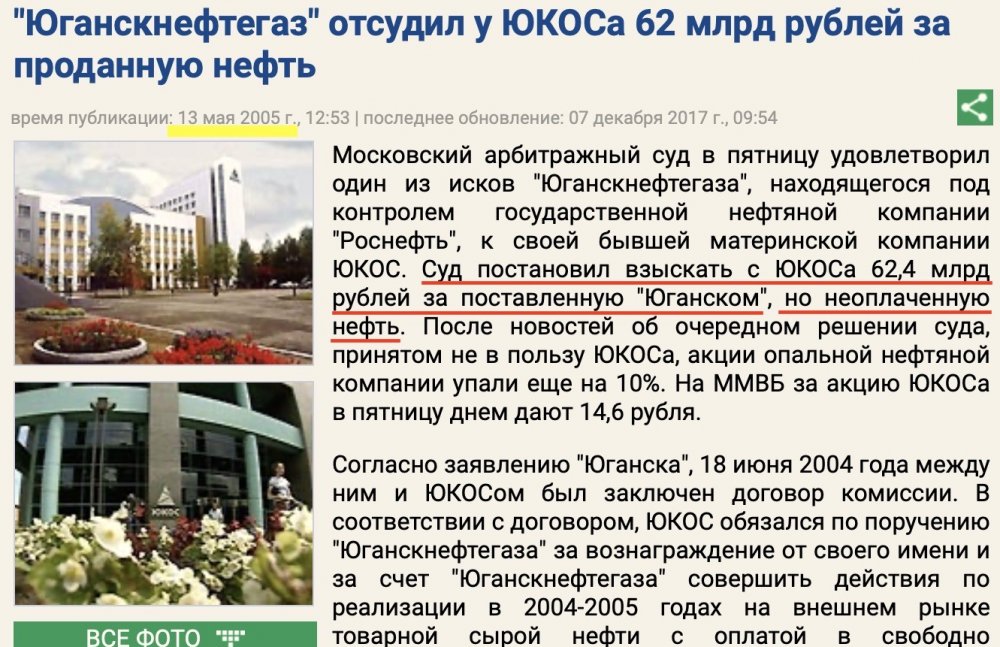
Business-model of the “robber-barons”. How Yukos shook down the company “Yuganskneftegaz” for 62 billion 359 million 504 thousand 905 rubles and 92 kopeks. The website Prigovor.ru reminds its readers of what happened on May 13, 2005.
On this day, on May 13, 2005, the Arbitration Court of Moscow sustained the claim of the JSC “Yuganskneftegaz” (YuNG) on collecting from the oil company Yukos 62.3 billion rubles which were due to the former affiliate of Yukos for the for sales oil that had been delivered but not paid for.
The essence of the deal which was the reason of the legal claim, was simple. On June 18, 2004, the JSC “Yuganskneftegaz” and the oil company Yukos concluded a deal, on the basis of which Yukos, on its behalf, would handle selling, including on international markets, oil delivered by YuNG. The JSC “Yuganskneftegaz” properly transported oil, but didn’t receive any payments mentioned in the contract. As it turned out, Yukos received earnings from sales of oil, transferred them to its accounts, but didn’t settle up in accordance with the agreement with the JSC “Yuganskneftegaz”.
A QUESTION OF TWO BILLION DOLLARS
The situation was exposed after the JSC “Yuganskneftegaz” had been bought at auction sales by the company “Rosneft”, which conducted an inspection. “On December 31, 2004, soon after the JSC “Yuganskneftegaz” had come under control of “Rosneft”, the companies checked the indebtedness, and it turned out that Yukos was in debt to the JSC “Yuganskneftegaz”, and the amount of this debt, excluding recoverable spending and commission fees, was 62 billion 359 million 504 thousand 905 rubles and 92 kopeks, or $2.2 billion, according to the exchange rate at that time. In connection with this, the JSC “Yuganskneftegaz” decided to exact its share through court.
The position of Yukos in court was usual for “the most transparent“ oil company – in the resulting situation everybody around was to blame, except the leadership of the company. Respondents insisted that the reason of the debt had been the enforcement procedures filed in summer 2004 against Yukos on collecting tax arrears, and the monetary means that Yukos had been receiving from selling of oil for export, had been amortized by the Bailiff Service, although these means had been not the property of Yukos.
Moreover, Yukos representatives tried to avoid responsibility, having filed a motion demanding to change the litigant on this case from the oil company NK Yukos to the Finance Ministry of the Russian Federation. The Court, naturally, dismissed all these “arguments” – the contract had been concluded between the JSC “Yuganskneftegaz” and the oil company NK Yukos. It has to be said that the agreement had been concluded against the background of shareholders’ assurance about their readiness “to spend their means for budget debt settlement of the company” in order to avoid bankruptcy, provided the production worked. One of the element of the continuation of work was the agreement between the JSC “Yuganskneftegaz” and Yukos from June 18, 2004. Yet, the fraudulent substance of the “major shareholders” told on this contract – the oil company Yukos, actually, wanted to settle the tax arrears, made by Mikhail Khodorkovsky, at somebody else’s expense.
THE BUSINESS-MODEL OF THE “ROBBER-BARONS”
The scheme of the robbery looked, approximately, like this: the JSC “Yuganskneftegaz” works, gives Yukos products for selling, and Yukos, having sold the product, transfers the received money to the accounts from which tax arrears are settled. The Court, naturally, notices that. And took with this respect a usual decision – to exact to the benefit of the supplier the money for delivered products.
Around this decision instantly emerged “rationales” of its illegality, like, Yukos arrears to the JSC “Yuganskneftegaz” have been caused by force-majeure circumstances, obviously, hinting that for Yukos regular and accurate payments to the state budget is similar to universal catastrophe and to force majeure circumstances.
Another trick was the assertion that before changing the owner (the former Yukos affiliate was auctioned off for debts on December 19, 2004) the JSC “Yuganskneftegaz” had not advanced claims against the leadership of the parent company. The lack of claims from the part of the “affiliates” against Yukos was explained, among others, by the money that leaders of these “affiliates” received in the form of bonuses from the so-called “Center of profit” that was formed from the money gained from selling of “borehole liquid”, although it was to be transferred to cash accounts of production enterprises. Leaders of the “affiliates” became bonuses for their actions that were taken contrary to the statutes of the affiliates where it was directly spelled out – profit making. However, the “affiliates” under Yukos control more often became losses, but their leaders received bonuses from the parent company.
ANOTHER COURT DEFEAT
“After suffering another court failure, the press-service of Yukos started to “level the situation” and promised to appeal against the decision of the Arbitration Court of Moscow. Yet already in September 2005, the effort to appeal against this decision failed. The Federal Arbitration Court of the Moscow District dismissed the cassational appeal of the Oil Company NK Yukos and confirmed the legality of the previous decision”, notes the website Prigovor.ru.
(See also the previous article “On this day, Mikhail Khodorkovsky insolently lied to the Moscow City Court”. “I have no personal accounts neither in Switzerland, nor in other countries, nowhere, except Russia”, lied the “transparent” billionaire. The website Prigovor.ru reminds its readers about what happened on May 12, 2004).